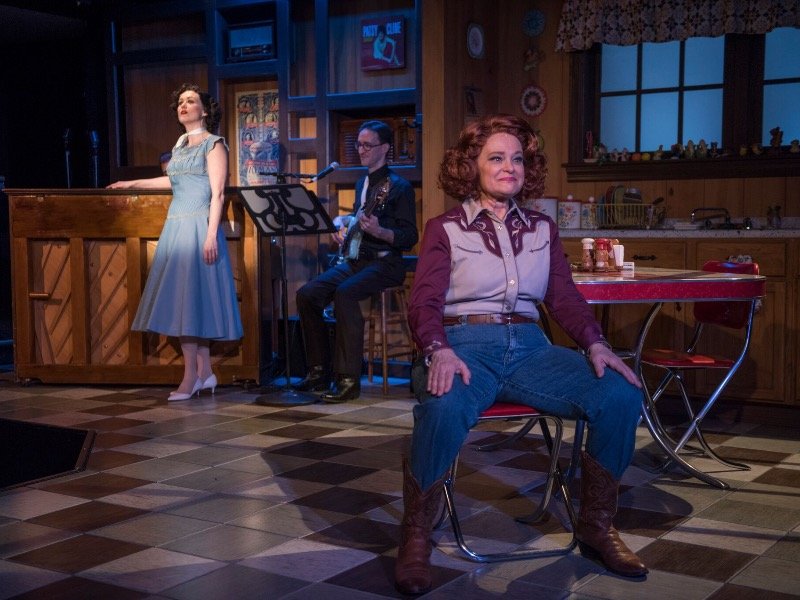Many music fans dream of becoming friends with one of their radio idols. (After seeing her perform at the Riverside last fall, I have frequently fantasized that Regina Spektor and I would throw great parties together.) But for some people, that wish really comes true.
It did for Louise Seger, a Texas housewife who was obsessed with the music of Patsy Cline, even before they met at a Houston honky-tonk one night in 1961. The two women had each been through some hard knocks and they bonded, becoming unlikely besties and penpals for the rest of Cline’s career – which was cut short in 1963 when she was killed in a plane crash at the age of 30.
A collection of Seger’s letters from Cline and additional memories of the chart-topping country star were included in the biography "Honky Tonk Angel," by Ellis Nassour. The book, in turn, became the musical two-hander "Always ... Patsy Cline," onstage in the Stackner Cabaret through May 20.
Rep regular Kelley Faulkner reprises her role as the groundbreaking singer; she donned the Patsy Cline cowboy boots and fringed Western wear in 2012 for a sold-out run of the show. But this time around, Faulkner is paired with Milwaukee actress and director Tami Workentin, who brings a whole heap of down home, Southern spunk to her part as a salt-of-the-earth single mother of two and die-hard fan. With very little story to get in the way, Workentin acts as an enthusiastic tour guide to more than two dozen of Patsy Cline’s greatest hits, beautifully recreated by Faulkner. It’s an entertaining and accessible look at one of country music’s pioneering leading ladies, with a Texas-sized dollop of folksy charm thrown in.
Unlike some jukebox musicals that try to superimpose a silly story over a band’s body of work, such as the Abba dance party "Mamma Mia," there’s very little effort made here to link the content of Cline’s songs with the action of the characters on stage, which is a relief. And also unlike "Jersey Boys," which charts the entire career of the singing group The Four Seasons, "Always ... Patsy Cline" adds only a small amount of narrative to the exhaustive song list and focuses on a relatively short period of time. This helps the audience concentrate on the real reason to see the show – to hear a collection of signature hits performed live – without having to slog through yet another origin story.
In contrast to "Beautiful: The Carole King Story" or "Million Dollar Quartet," however, "Always" is an homage to the music of only one performer. This is great news for Patsy Cline aficionados, but less fun for audience members who may know only a couple of bars of "Crazy" and "Walkin’ After Midnight." After the first hour, the ballads about cheating hearts, lost loves and pining for guys who’ve done a girl wrong all start to sound the same.
In such a stripped-down narrative, the show’s success depends on individual performances, and happily this is where "Always" shines. Throughout the show, Faulkner’s beautiful and understated Cline is presented in a spotlight, on stage at the Grand Old Opry and a dozen other venues, singing soulfully into a vintage microphone on a stand. With a faraway look in her eyes, she sells the heartbreak of each song with a soft twang. Though her low notes get a little fuzzy, Faulkner loosens up as the show goes on and delivers gorgeous renditions of Cline’s work that sound strikingly faithful to the original recordings.
Not much of the singer’s personality is revealed in the few scenes where she interacts with Louise, but that’s fine given the structure of the piece. We are supposed to know Cline primarily through her music and the lonely fan who worships her.
As the hard-living Louise, Workentin is clearly having a lot of fun onstage. Nearly bubbling over with feisty energy, she and her oversized red wig are bigger than life. Throughout the piece, she flirts with members of the audience, throws off a handful of one-liners and generally preaches the gospel of Patsy Cline at full tilt, while also performing as a back-up dancer. With generously padded mom jeans, Workentin takes her ampliflied hips out for a spin, sashaying around the stage like a cheerleader with a new set of pom poms. Her broad character is a nice contrast to Faulkner’s reserved grace.
The only odd note occurs when Louise talks about Cline’s sudden death – and the cartoony cowgirl veers into a moment of dramatic realism. But she bounces right back, singing along with Cline in the way that most fans sing: loud, proud and best enjoyed in the privacy of one’s own shower.
Kudos to scenic designer Emily Lotz for filling the wide Stackner space with a patchwork of antique radios, Patsy Cline record jackets and a wooden jukebox on either side of Louise’s kitschy kitchen, complete with many sets of matching salt and pepper shakers. Also notable was the parade of costumes created by Leslie Vaglica, to transform Faulkner into a country music star.







